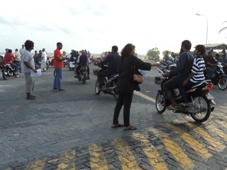The Civil Court last night issued a temporary injunction ordering the Finance Ministry not to release funds to parliament for MPs’ committee allowance until the court rules on a case filed on behalf of a civil servant, contending that the allowance could not be given before deducted amounts from civil servants salaries were paid back.
A group of concerned citizens protesting the committee allowance filed the case on behalf of Maah Jabeen, Seenu Maradhoo Fenzeemaage, arguing that releasing funds for committee allowance without reimbursing civil servants violated constitutional provisions on fairness and equal treatment.
The committee allowance was approved on December 29, 2010 while wage cuts were enforced in October 2009.
In January 2010, the Civil Service Commission’s (CSC) decided to reverse the pay cuts, sparking an ongoing legal dispute between the commission and the Finance Ministry.
At the height of the dispute last year, permanent secretaries of line ministries were ordered to submit different wage sheets by the commission and the ministry.
Speaking to Minivan News after Judge Hathif Hilmy granted the injunction last night, lawyer Mohamed Shafaz explained that the case was based on article 43 of the constitution, which states that everyone has the right to fair and just administrative action, “by which we take to mean that constitutional provisions in articles 17 and 20 relating to equality and non-discrimination would be infringed of a civil servant if the Ministry of Finance chooses to release the funds for committee allowance to the People’s Majlis before the deducted amounts from the salaries of civil servants is paid to them.”
“Our argument was based on the principle of judicial review,” he continued. “For judicial review to be used in a case in the Maldives is relatively rare and this is I would say a novel case. Our idea is that anyone vested with legal powers must act within the limits of the constitution.”
Delivering the ruling on the request for a temporary injunction, the judge said that releasing the funds before the court issues a final judgment on the case “could cause irreversible damage to the plaintiff” and ordered the Finance Ministry not to take any action that could “defeat the purpose of the claim.”
While the state attorney insisted that neither the Finance Ministry nor the President’s Office has made a decision on releasing the funds, the claimants submitted video footage of President Mohamed Nasheed telling protestors that the executive could not overrule parliament’s decision without threatening separation of powers.
In April 2010, the Civil Court ruled that Finance Ministry did not have the legal authority to overrule the CSC. Although the government contested the ruling and refused to restore salaries to previous levels, the High Court upheld the lower court ruling in May this year.
The state attorney also argued that the case should not have been accepted by the Civil Court as the government has appealed the High Court verdict at the Supreme Court. The judge however ruled last night that the state could not produce documentation proving that the Supreme Court has decided to hear the appeal.
Attorney General Abdulla Muiz confirmed today that the AG office has appealed last night’s lower court decision at the High Court.
Shafaz meanwhile observed that “the ruling [yesterday] affirms that the court recognises that there is an issue here that needs to be rectified or subject to the system of justice.”
“It is also significant because by granting the temporary injunction the court has accepted and taken on an active role for implementing judicial review in the Maldives,” he said. “So this opens up the possibility for each and every action of the executive branch of the government, or the parliament or any other part of the state, to be challenged in the courts.”
Yesterday’s temporary injunction was also significant because “it was based on infringement of the rights of an individual,” Shafaz continued, adding that it was “a case where the act of a minister of the executive could infringe upon the rights of an individual.”
The favoured outcome for the group of concerned citizens would meanwhile be “for the court to recognise that giving parliamentarians their committee allowance before the deducted salary is given would be an infringement of the rights of a civil servant, or civil servants, under the constitution.”


